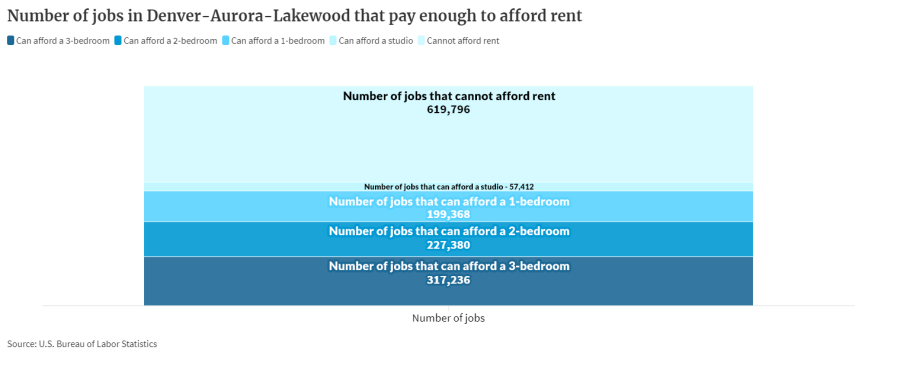DENVER (KDVR) — Count yourself lucky if you can comfortably live in a two-bedroom apartment in the Denver metro area – you’re in the top third of the area’s purchasing power.
To top off the record single-family home prices in Colorado, KDVR Data Desk analysis found that only half the jobs in the Denver-Aurora-Lakewood statistical area can afford to pay rent for an apartment.
Of the region’s total employment, 620,000 of the jobs held by Coloradans pay enough to put 30% of monthly take-home pay towards rent – the guideline for living within one’s means for renters.
The 2021 Out of Reach report, compiled by the National Low Income Housing Coalition, has found the average minimum-wage employee in the United States would need to work 97 hours per week to cover an “affordable” two-bedroom home at Fair Market Rent, as defined by the U.S. Department of Housing and Urban Development.
According to the analysis of the country’s median rent prices, it would take $27.50 an hour in order to spend no more than the guideline 30% of net income on rent in Colorado.
In the Denver-Lakewood-Aurora statistical area, that price is even higher.
Data analyzed by real estate investment tracking sites Stessa and Rentdata, lists Fair Market rent at $1,600-$1,700 a month for a two-bedroom apartment.
Other rental trackers have higher prices. An ApartmentGuide.com report pegs Denver’s average one-bedroom rent at nearly $2,100 and Aurora’s one-bedroom rent at $1,700.
Even with the more conservative Fair Market rent estimates, the difference between rental prices and the jobs that can pay for them is less than rosy.

Half the jobs in Colorado pay enough to afford the median metro rental price for a one-bedroom apartment.
Only one-third of Colorado’s jobs – about 550,000 – can pay for a two-bedroom apartment. Only one-fifth, 317,000, can pay for a three-bedroom apartment.
The jobs, particularly for two- and three-bedroom apartments, are largely upper-tier. Some of the most common categories include management, STEM field experts, oil and gas experts, attorneys, mid- to high-level corporate positions or government administration.
